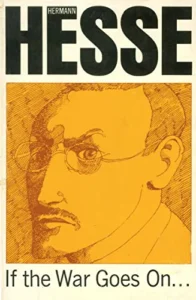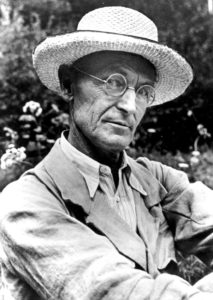Hermann Hesse on Hope, the Difficult Art of Taking Responsibility, and the Wisdom of the Inner Voice
INSPIRATIONAL, 20 May 2024
Maria Popova | The Marginalian – TRANSCEND Media Service
 “Character — the willingness to accept responsibility for one’s own life — is the source from which self-respect springs,” Joan Didion wrote in her timeless essay on self-respect. And yet this willingness does not come naturally to the human animal. We glance left and right, we peer above and below, placing the responsibility for our suffering everywhere but at the center of our own being. We treat the unhandsome consequences of our actions as something that happens to us, at us, by some wretched external causality. In the process, the tick of our self-righteousness grows fatter and fatter on bloodthirsty blame.
“Character — the willingness to accept responsibility for one’s own life — is the source from which self-respect springs,” Joan Didion wrote in her timeless essay on self-respect. And yet this willingness does not come naturally to the human animal. We glance left and right, we peer above and below, placing the responsibility for our suffering everywhere but at the center of our own being. We treat the unhandsome consequences of our actions as something that happens to us, at us, by some wretched external causality. In the process, the tick of our self-righteousness grows fatter and fatter on bloodthirsty blame.
The great German poet, novelist, and painter Hermann Hesse (July 2, 1877–August 9, 1962) offered an antidote to this all too human tendency in one of his least known pieces of writing, composed as the world was coming back to consciousness after the First World War.
The war had violently ejected Hesse from the exultations of his youth. But he never lost his idealism — he became an impassioned advocate for pacifism and its wellspring in the mindfulness of individuals. Over the next three decades, through the aftermath of one devastating war and the harrowing actuality of another, Hesse composed a series of remarkable, clear-minded, largehearted essays, letters, and pamphlets condemning his compatriots for the unthinking herd mentality that had allowed Hitler’s rise to power and inviting what he saw as the only salvation for them: a new ethos of responsibility, beginning at the personal level upon which the political rests. He was especially invested in invigorating the young — the next generations who had inherited a burden not their own and upon whose shoulders the task of redemption fell with spirit-crushing weight.
These pieces were eventually collected in 1946 — the year Hesse received the Nobel Prize — and later published as If the War Goes On… (public library). Among them is the stirring “Letter to a Young German,” written to a dispirited youth in 1919 — a decade before the publication of Rilke’s almost spiritual classic Letters to a Young Poet, and brimming with kindred consolation for the transcendent traumas of living. This was a momentous year for Hesse. Having recently lost his marriage to the fallout of his wife’s acute mental illness, he had just left Berlin to settle alone in a small farmhouse in Switzerland. WWI had just ended, having begun as “the war to end all wars,” instead netting millions of deaths and laying the gruesome groundwork for future genocides. That year, Hesse signed Romain Rolland’s Declaration of the Independence of the Mind — the extraordinary manifesto for critical thinking and pacifism, co-signed by such luminaries as Albert Einstein, Bertrand Russell, Rabindranath Tagore, Jane Addams, and Upton Sinclair.
Hesse addresses his despairing young correspondent while himself perched on this precipice between optimism and despair. Three years before Bertrand Russell made his timeless case for what he termed “the will to doubt,” Hesse writes:
You write me that you are in despair and do not know what to believe, what to hope. You do not know whether or not there is a God. You do not know whether or not life has any meaning, whether or not love of country has a meaning, whether, in the wretched condition of the world, it is better to strive for spiritual goods or merely to fill your belly.
I believe your state of mind and soul to be the right one. Not to know whether there is a God, not to know whether there is good and evil, is far better than to know for sure.
More than half a century before Jacob Bronowski admonished against the dark side of certainty, Hesse offers a sobering antidote to the destructive self-righteousness our certitudes delude us into:
Five years ago, if you remember, I should say you were pretty well convinced there was a God, and above all you had no doubt as to what was good and what was evil. Naturally you did what you thought was good and marched off to war. For five years now, the best years of your youth, you have kept on doing “good”: you have fired a gun, gone over the top, lounged about in barracks and mud holes, buried comrades or bandaged their wounds. And little by little you began to doubt the good, to suspect that the good and glorious occupation you were engaged in was fundamentally evil, or at the very least stupid and absurd.
And so it was. Evidently the good you were so sure of at the time was not the right good, the good that is indestructible and timeless; and evidently the God you knew in those days was not the right God… Hundreds of thousands of bloody battle sacrifices were offered up to him, and in his honor hundreds of thousands of bellies were slit open, hundreds of thousands of lungs torn to pieces; he was more bloodthirsty and brutal than any idol…

With an eye to the tragic human tendency toward perpetrating wrong under the trance of self-righteousness — a tendency as devastating in the personal realm as it is in the political — he holds up a discomfiting mirror to the self-righteous:
Has anyone stopped to consider, and to wonder at the fact, that in those four years of war our theologians buried their own religion, their own Christianity? Committed to the service of love, they preached hatred; committed to the service of mankind, they mistook for mankind the authorities who paid them.
Decades before James Baldwin observed that “it has always been much easier (because it has always seemed much safer) to give a name to the evil without than to locate the terror within” and a century before Anne Lamott admonished against how self-righteousness syphons self-respect, Hesse contemplates “the disastrous art of putting the blame on others when we are in trouble” and exhorts for personal responsibility over self-righteous blamefulness:
We are all of us equally guilty and innocent of the fact that our faith was so weak and our officially patented God so ruthless, that we were so incapable of distinguishing war and peace, good and evil. You and I, the Kaiser and the priest, all played a part; we have no call to accuse one another.
[…]
It is childish and stupid to ask whether this one or that one is guilty. I propose that for one short hour we ask ourselves instead: “What about myself? What has been my share of the guilt? When have I been too loudmouthed, too arrogant, too credulous, too boastful? What is there in me that may have helped… all the illusions that have so suddenly collapsed?”
Echoing Emerson’s foundational ideas about nonconformity and self-reliance — “Trust thyself: every heart vibrates to that iron string,” the Sage of Concord, whom Hesse read and greatly admired, had written in the previous century — Hesse offers his young correspondent the only real and reliable source of comfort:
If you are now wondering where to look for consolation, where to seek a new and better God, a new and better faith, you will surely realize, in your present loneliness and despair, that this time you must not look to external, official sources, to Bibles, pulpits, or thrones, for enlightenment. Nor to me. You can find it only in yourself. And there it is, there dwells the God who is higher and more selfless… The sages of all time have proclaimed him, but he does not come to us from books, he lives within us, and all our knowledge of him is worthless unless he opens our inner eye. This God is in you too. He is most particularly in you, the dejected and despairing… Search where you may, no prophet or teacher can relieve you of the need to look within… Don’t confine yourself… to any other prophet or guide. Our mission is not to instruct you, to make things easier for you, to show you the way. Our mission is solely to remind you that there is a God and only one God; he dwells in your hearts, and it is there that you must seek him out and speak with him.
To hear and heed that inner voice — the sound-minded, pure-hearted critical thinking unmuffled by the shriek of self-righteousness, unlulled by herd mentality, unsullied by external manipulation or internal self-delusion — is perhaps the most consistent challenge we face throughout our lives, playing out in myriad forms across every realm of existence.
Complement with E.B. White’s lovely letter to a man who had lost faith in humanity and Seamus Heaney’s splendid advice to the young, then revisit Hesse on why we read and always will, the three types of readers, savoring the little joys of life, and what trees teach us about belonging and life.
_______________________________________
 My name is Maria Popova — a reader, a wonderer, and a lover of reality who makes sense of the world and herself through the essential inner dialogue that is the act of writing. The Marginalian (which bore the unbearable name Brain Pickings for its first 15 years) is my one-woman labor of love, exploring what it means to live a decent, inspired, substantive life of purpose and gladness. Founded in 2006 as a weekly email to seven friends, eventually brought online and now included in the Library of Congress permanent web archive, it is a record of my own becoming as a person — intellectually, creatively, spiritually, poetically — drawn from my extended marginalia on the search for meaning across literature, science, art, philosophy, and the various other tendrils of human thought and feeling. A private inquiry irradiated by the ultimate question, the great quickening of wonderment that binds us all: What is all this? (More…)
My name is Maria Popova — a reader, a wonderer, and a lover of reality who makes sense of the world and herself through the essential inner dialogue that is the act of writing. The Marginalian (which bore the unbearable name Brain Pickings for its first 15 years) is my one-woman labor of love, exploring what it means to live a decent, inspired, substantive life of purpose and gladness. Founded in 2006 as a weekly email to seven friends, eventually brought online and now included in the Library of Congress permanent web archive, it is a record of my own becoming as a person — intellectually, creatively, spiritually, poetically — drawn from my extended marginalia on the search for meaning across literature, science, art, philosophy, and the various other tendrils of human thought and feeling. A private inquiry irradiated by the ultimate question, the great quickening of wonderment that binds us all: What is all this? (More…)
Go to Original – themarginalian.org
Tags: Herman Hesse, Inspirational, Wisdom
DISCLAIMER: The statements, views and opinions expressed in pieces republished here are solely those of the authors and do not necessarily represent those of TMS. In accordance with title 17 U.S.C. section 107, this material is distributed without profit to those who have expressed a prior interest in receiving the included information for research and educational purposes. TMS has no affiliation whatsoever with the originator of this article nor is TMS endorsed or sponsored by the originator. “GO TO ORIGINAL” links are provided as a convenience to our readers and allow for verification of authenticity. However, as originating pages are often updated by their originating host sites, the versions posted may not match the versions our readers view when clicking the “GO TO ORIGINAL” links. This site contains copyrighted material the use of which has not always been specifically authorized by the copyright owner. We are making such material available in our efforts to advance understanding of environmental, political, human rights, economic, democracy, scientific, and social justice issues, etc. We believe this constitutes a ‘fair use’ of any such copyrighted material as provided for in section 107 of the US Copyright Law. In accordance with Title 17 U.S.C. Section 107, the material on this site is distributed without profit to those who have expressed a prior interest in receiving the included information for research and educational purposes. For more information go to: http://www.law.cornell.edu/uscode/17/107.shtml. If you wish to use copyrighted material from this site for purposes of your own that go beyond ‘fair use’, you must obtain permission from the copyright owner.
